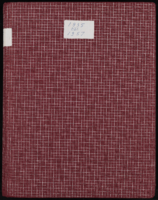The Rebel Yell
Alternate Title
Description
The Rebel Yell and cultural identity at UNLV
The UNLV student newspaper, like the university itself, has gone through many changes not least, its
name. When the paper made its debut in 1955, what was to become UNLV was the Southern Regional
Division of the University of Nevada, in Reno, popularly known as Nevada Southern. The newspaper,
reflecting its identity with the southern part of the state as well as its ongoing opposition to the
northern-centric bias of the State Legislature in Carson City and the administration of the University of
Nevada in Reno, adopted the name “Rebel Yell” and flew a Confederate flag on its mast head. The
fledgling university took to its identity as “Rebels” which, in fact, continues as a brand for the university
and its students to this day. While administrators and students would later deny any conscious or
intended association of these historical Confederate symbols with the southern Confederacy, slavery,
and racism, they would, nonetheless cause embarrassment in the future when Black (and White)
students began to express their indignation with these symbols and demand that the university change
its image.
In 1962 the most flagrant symbol, the Confederate flag, was removed from the masthead to be replaced
by the only marginally less problematic “Beauregard” figure, a Disneyesque cartoon hound dog in a
Confederate uniform. In 1969 in the wake a national civil rights protests, Beauregard was yanked from
the masthead. In 1970 the student senate, the “Confederated Students” (which would change its name
to “Consolidated Students” in 1973) instituted a “Rebel Name-change committee” charged with coming
up with alternative names. The next year in 1971 the students voted to retain their nickname, the
Rebels, by which their sports teams had traditionally been known, but the newspaper decided to change
its name from the Rebel Yell to The Yell, but affirming on its front page “We’re Still Rebels”. In 1973
when the student senate changed its name, the students again rejected changing the Rebels nick-name.
Only in 1975 was Beauregard officially removed as the university mascot.
In 1982 artist Mike Smith created a new UNLV mascot, the “Hey Reb” trail-blazing pathfinder, in western
frontier garb, with mustachios that rendered him a look-alike for the cartoon character Yosemite Sam. In
1983 the Yell quietly resumed its old title Rebel Yell (briefly the Yellin Rebel) which persisted until 2016,
when, after months of deliberation and renewed calls to rebrand the university the Rebel Yell became
the Scarlet & Gray Free Press, adopting the school colors. According to then-Editor-in-chief Bianca Cseke
“a Confederate battle cry isn’t a great name for a newspaper.”
Essay Contributed by Peter Michel
2003
November
2004
February
March
- The Rebel Yell MONDAY ISSUE (2004-03-01)
- The Rebel Yell THURSDAY ISSUE (2004-03-04)
- The Rebel Yell MONDAY ISSUE (2004-03-08)
- The Rebel Yell THURSDAY ISSUE (2004-03-11)
- The Rebel Yell MONDAY ISSUE (2004-03-15)
- The Rebel Yell THURSDAY ISSUE (2004-03-18)
- The Rebel Yell MONDAY ISSUE (2004-03-22)
- The Rebel Yell THURDAY ISSUE (2004-03-25)
- The Rebel Yell MONDAY ISSUE (2004-03-29)
April
August
September
- The Rebel Yell, Vol. 50, No. 3 Thursday Edition (2004-09-09)
- The Rebel Yell, Vol. 50, No. 4 Monday Edition (2004-09-13)
- The Rebel Yell, Vol. 50, No. 5 Thursday Edition (2004-09-16)
- The Rebel Yell, Vol. 50, No. 6 Monday Edition (2004-09-20)
- The Rebel Yell, Vol. 50, No. 8 Monday Edition (2004-09-27)
- The Rebel Yell, Vol. 50, No. 9 Thursday Edition (2004-09-30)
October
- The Rebel Yell, Vol. 50, No. 10 Monday Edition (2004-10-04)
- The Rebel Yell, Vol. 50, No. 11 Thursday Edition (2004-10-07)
- The Rebel Yell, Vol. 50, No. 12 Monday Edition (2004-10-11)
- The Rebel Yell, Vol. 50, No. 13 Thursday Edition (2004-10-14)
- The Rebel Yell, Vol. 50, No. 14 Monday Edition (2004-10-18)
- The Rebel Yell, Vol. 50, No. 15 Monday Edition (2004-10-21)
- The Rebel Yell, Vol. 50, No. 16 Monday Edition (2004-10-25)
November
- The Rebel Yell, Vol. 50, No. 17 Monday Edition (2004-11-01)
- The Rebel Yell, Vol. 50, No. 18 Thursday Edition (2004-11-04)
- The Rebel Yell, Vol. 50, No. 19 Monday Edition (2004-11-08)
- The Rebel Yell, Vol. 50, No. 20 Monday Edition (2004-11-15)
- The Rebel Yell, Vol. 50, No. 21 Thursday Edition (2004-11-18)
- The Rebel Yell, Vol. 50, No. 22 Monday Edition (2004-11-22)
2005
January
February
- The Rebel Yell, Vol. 50, No. 31 Thursday Edition (2005-02-03)
- The Rebel Yell, Vol. 50, No. 32 Monday Edition (2005-02-07)
- The Rebel Yell, Vol. 50, No. 33 Thursday Edition (2005-02-10)
- The Rebel Yell, Vol. 50, No. 35 Monday Edition (2005-02-14)
- The Rebel Yell, Vol. 50, No. 34 Thursday Edition (2005-02-17)
- The Rebel Yell, Vol. 50, No. 37 Thursday Edition (2005-02-24)
- The Rebel Yell, Vol. 50, No. 36 Monday Edition (2005-02-28)
March
- The Rebel Yell, Vol. 50, No. 39 Thursday Edition (2005-03-03)
- The Rebel Yell, Vol. 50, No. 40 Monday Edition (2005-03-07)
- The Rebel Yell, Vol. 50, No. 41 Thursday Edition (2005-03-10)
- The Rebel Yell, Vol. 50, No. 42 Monday Edition (2005-03-14)
- The Rebel Yell, Vol. 50, No. 43 Thursday Edition (2005-03-17)
- The Rebel Yell, Vol. 50, No. 44 Monday Edition (2005-03-28)
- The Rebel Yell, Vol. 50, No. 45 Thursday Edition (2005-03-31)
April
- The Rebel Yell Thursday Edition (2005-04-01)
- The Rebel Yell, Vol. 50, No. 46 Monday Edition (2005-04-04)
- The Rebel Yell, Vol. 50, No. 47 Thursday Edition (2005-04-07)
- The Rebel Yell, Vol. 50, No. 48 Monday Edition (2005-04-11)
- The Rebel Yell, Vol. 50, No. 49 Thursday Edition (2005-04-14)
- The Rebel Yell, Vol. 50, No. 50 Monday Edition (2005-04-18)
- The Rebel Yell, Vol. 50, No. 51 Thursday Edition (2005-04-21)
- The Rebel Yell, Vol. 50, No. 52 Monday Edition (2005-04-25)
- The Rebel Yell, Vol. 50, No. 53 Thursday Edition (2005-04-28)
May
September
October
- The Rebel Yell, Vol. 51, No. 15 (2005-10-03)
- The Rebel Yell, Vol. 51, No. 16 (2005-10-06)
- The Rebel Yell, Vol. 51, No. 17 (2005-10-10)
- The Rebel Yell, Vol. 51, No. 18 (2005-10-13)
- The Rebel Yell, Vol. 51, No. 19 (2005-10-17)
- The Rebel Yell, Vol. 51, No. 20 (2005-10-20)
- The Rebel Yell, Vol. 51, No. 21 (2005-10-24)
- The Rebel Yell, Vol. 51, No. 22 (2005-10-31)
November
2006
January
February
- The Rebel Yell, Vol. 51, No. 37 (2006-02-02)
- The Rebel Yell, Vol. 51, No. 38 (2006-02-06)
- The Rebel Yell, Vol. 51, No. 39 (2006-02-09)
- The Rebel Yell, Vol. 51, No. 40 (2006-02-13)
- The Rebel Yell, Vol. 51, No. 41 (2006-02-16)
- The Rebel Yell, Vol. 51, No. 42 (2006-02-23)
- The Rebel Yell, Vol. 51, No. 43 (2006-02-27)
March
April
- The Rebel Yell, Vol. 51, No. 50 (2006-04-03)
- The Rebel Yell, Vol. 51, No. 51 (2006-04-06)
- The Rebel Yell, Vol. 51, No. 52 (2006-04-10)
- The Rebel Yell, Vol. 51, No. 53 (2006-04-13)
- The Rebel Yell, Vol. 51, No. 54 (2006-04-17)
- The Rebel Yell, Vol. 51, No. 55 (2006-04-20)
- The Rebel Yell, Vol. 51, No. 56 (2006-04-24)
- The Rebel Yell, Vol. 51, No. 57 (2006-04-27)
August
September
October
- The Rebel Yell, Vol. 52, No. 16 (2006-10-02)
- The Rebel Yell, Vol. 52, No. 18 (2006-10-09)
- The Rebel Yell, Vol. 52, No. 19 (2006-10-12)
- The Rebel Yell, Vol. 52, No. 21 (2006-10-19)
- The Rebel Yell, Vol. 52, No. 22 (2006-10-23)
- The Rebel Yell, Vol. 52, No. 23 (2006-10-26)
- The Rebel Yell, Vol. 52, No. 24 (2006-10-30)
November
- The Rebel Yell, Vol. 52, No. 25 (2006-11-02)
- The Rebel Yell, Vol. 52, No. 26 (2006-11-06)
- The Rebel Yell, Vol. 52, No. 27 (2006-11-09)
- The Rebel Yell, Vol. 52, No. 28 (2006-11-13)
- The Rebel Yell, Vol. 52, No. 29 (2006-11-16)
- The Rebel Yell, Vol. 52, No. 30 (2006-11-20)
- The Rebel Yell, Vol. 52, No. 31 (2006-11-27)
- The Rebel Yell, Vol. 52, No. 32 (2006-11-30)
2007
January
February
March
April
- The Rebel Yell, Vol. 52, No. 54 (2007-04-05)
- The Rebel Yell, Vol. 52, No. 55 (2007-04-09)
- The Rebel Yell, Vol. 52, No. 56 (2007-04-12)
- The Rebel Yell, Vol. 52, No. 57 (2007-04-16)
- The Rebel Yell, Vol. 52, No. 58 (2007-04-19)
- The Rebel Yell, Vol. 52, No. 59 (2007-04-23)
- The Rebel Yell, Vol. 52, No. 60 (2007-04-26)
- The Rebel Yell, Vol. 52, No. 61 (2007-04-30)
Language
English





